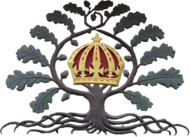Our website is made possible by displaying online advertisements to our visitors.
Please consider supporting us by disabling your ad blocker.
High Tory
| Part of the Politics series on |
| Toryism |
|---|
 |
| Part of a series on |
| Conservatism |
|---|
 |
| Part of a series on |
| Nationalism |
|---|
In the United Kingdom and elsewhere, High Toryism is the old traditionalist conservatism which is in line with the Toryism originating in the 16th century. High Tories and their worldview are sometimes at odds with the modernising elements of the Conservative Party. Historically, the late 18th-century conservatism derived from the Whig Edmund Burke and William Pitt the Younger marks a watershed from the "higher" or legitimist Toryism that was allied to Jacobitism.
High Toryism has been described by Andrew Heywood as neo-feudalist[1] in its preference for a traditional hierarchical and patriarchal society over modern freedom and equality, as well for holding the traditional gentry as a higher cultural benchmark than the bourgeoisie and those who have attained their position through commerce or labour. Economically, High Tories generally tend to prefer paternalistic Tory corporatism and protectionism over the neo-liberalism and neo-conservatism that emerged in the 1960s.
- ^ Heywood, Andrew (2000-10-17). Key concepts in politics. Palgrave Macmillan. ISBN 9780312233815. Retrieved 2011-12-18.
Previous Page Next Page


